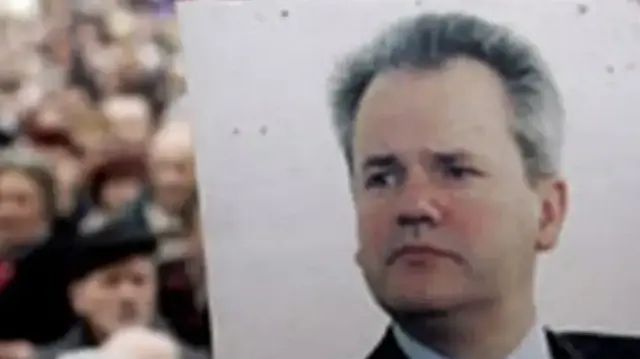25 years after his fall, Slobodan Milošević’s ideas are still alive

Reklam yükleniyor...
Reklam yükleniyor...
Reklam yükleniyor...
Reklam yükleniyor...
Reklam yükleniyor...
Reklam yükleniyor...
The screams of hundreds of thousands of people chanting “Gotov je!” (“He’s finished!”) still echo in my head. I was fourteen years old, watching the news with my parents in disbelief. Is it really the end of Slobodan Milošević’s brutal regime? I was a lost teenager, frightened and confused, having spent four years as a refugee and changed so many schools that I could barely remember any of them. My hometown, Sarajevo, was destroyed; the burned National Library was part of my view next to the TV. Many people, including peers I once knew, were killed during the aggression of Bosnian Serbs supported by the regime in Belgrade, and Sarajevo endured the longest siege in history. Young men who survived walked around with fragments of grenades embedded in their bodies. But we were not the only ones terrified and angry at the same time.
That day, young people in Belgrade, mostly students, demanded the resignation of Slobodan Milošević. The atmosphere in the Serbian capital was charged with a mix of anger, determination, and a yearning for change. They stormed the Federal Parliament building, smashing windows and setting parts of it ablaze. Simultaneously, demonstrators targeted the Radio Television of Serbia, the state broadcaster that had long served as Milošević’s propaganda mouthpiece. Protesters seized the building and, in a symbolic act of reclaiming the narrative, set it on fire. After his resignation, Milošević remained in Belgrade for months but was arrested in April the following year by the Yugoslav authorities. He was later transferred to The Hague, becoming the first former head of state extradited to face war crimes charges. Milošević was charged on 66 counts, including genocide, crimes against humanity, and war crimes in Bosnia and Herzegovina, Croatia, and Kosovo. The world watched as a head of state stood in the dock, a symbol of accountability.
Milošević never accepted the tribunal’s authority over him, mounting a robust defense of his presidency and launching fierce attacks on the court itself and the international community. He claimed that his trial was used to justify NATO’s bombing of Yugoslavia in 1999, an action taken to stop what was widely seen as Milošević’s campaign of ethnic cleansing in Kosovo. He argued that he was responding to a terrorist campaign in the province, which was predominantly populated by ethnic Albanians. But he never faced a final judgment. Five years later, he died in prison, leaving his trial unfinished and many victims without the closure they desperately sought. His death in custody felt like a cruel reminder that justice in the Balkans is always complicated, always fragile.
Trained as a banker in the communist system, Milošević rose to power in the late 1980s as the protégé of Serbian leader Ivan Stambolić, with whom he later split. Stambolić’s abduction and murder in 2000 is widely believed to have been orchestrated by Milošević. He was an opportunist but also a convinced nationalist and he used Serbian nationalism to win votes. Slobodan Milošević was one of the few politicians who understood that after the death of Tito, Yugoslavia’s strongmen, a void would need to be filled. He exploited Serbian grievances over lost territories following the collapse of Yugoslavia for his nationalist ideas, including the vision of a Greater Serbia that encompassed Kosovo and parts of Bosnia and Croatia.
Milošević went down in history as the butcher of the 20th century, giving the green light for genocide to be committed. Even today, many in the region believe that the closure of his trial without a sentence meant that his crimes escaped full accountability. The name Slobodan Milošević is still very much present in the Balkans’ narrative. Even today, he has many supporters across the region, most notably in Serbia and Bosnia’s entity Republika Srpska.
With the rise of genocide denialism and far-right nationalist parties around the world, his name is now mentioned even far from the Balkans. The attacker on Muslims in Christchurch, Brenton Tarrant, mentioned Milošević in his manifesto, supporting him over NATO and condemning its 1999 intervention in Kosovo. Tarrant denied being a member of any organizations but stated that he “only really took true inspiration” from Anders Breivik, the Norwegian far-right terrorist who killed 77 people in Oslo in 2011.
Before his attack, Breivik published a 1,500-page manifesto with hundreds of references to the conflicts in the Balkans. Breivik wrote that NATO’s bombing of Serbia during the Kosovo War in 1999 was a major motivation for his attack, saying it was “completely unacceptable” that U.S. and European governments “bombed our Serbian brothers.”
25 years later, Slobodan Milošević’s legacy lives on—not only in the memories of genocide, mass graves, sieges, and ethnic cleansing, but also in the lingering nationalism that continues to poison politics across the region. The ghosts of his policies haunt Serbia, Bosnia, and Kosovo, shaping a fragile peace built on contested narratives and unfinished reconciliation.
On the day of the fall of Milosevic I hopeful. But so many years later, I believe the Balkans still has a lot of work to do to fix the evil and divisons Milosevic and those around him created. The fight continues. We will not give up.
Reklam yükleniyor...
Reklam yükleniyor...







Comments you share on our site are a valuable resource for other users. Please be respectful of different opinions and other users. Avoid using rude, aggressive, derogatory, or discriminatory language.